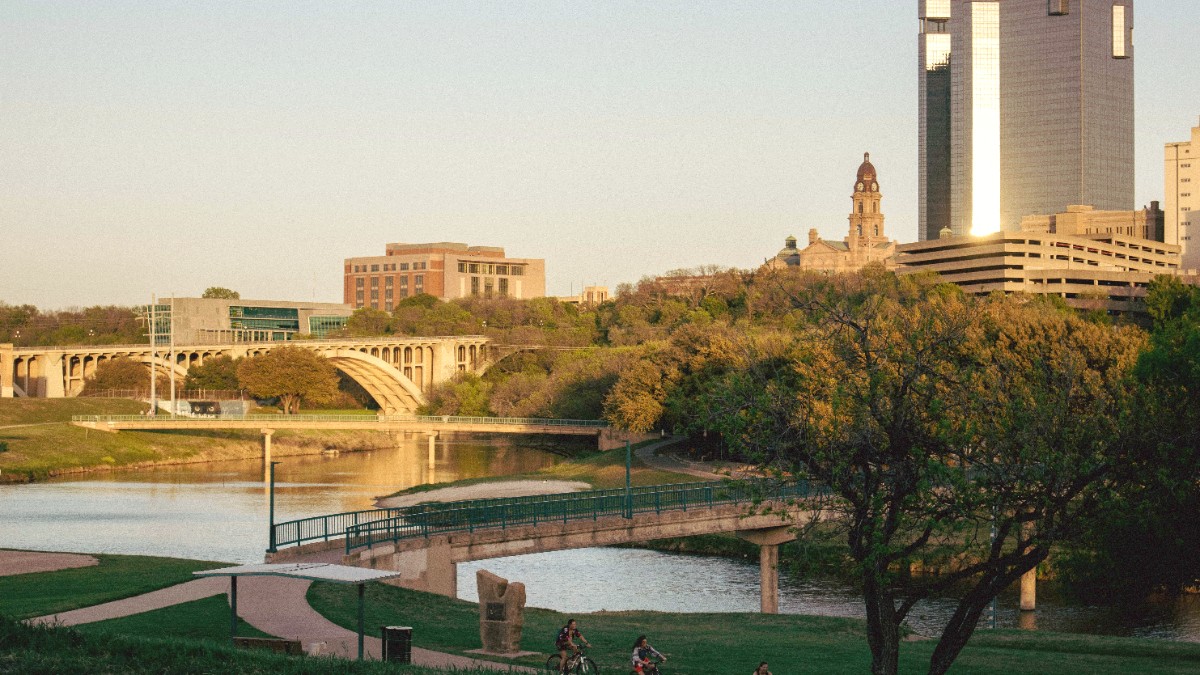
Texas, USA
Fort Worth's climate means distinct seasons. Spring (March-May) brings comfortable temperatures, rising from 60s to 80s°F (15-29°C), with increasing humidity and significant rainfall, including thunderstorms and a heightened risk of severe weather. Summer (June-August) means intense heat and high humidity, with daytime highs consistently in the 90s°F (32-37°C) and often over 100°F (38°C). Nights remain warm, often 70s°F (21-26°C). Rainfall is moderate, usually afternoon thunderstorms. Staying hydrated and inside air conditioning are priorities.
Fall (September-November) temperatures become more pleasant, generally 60s to 80s°F (15-29°C), with decreasing humidity. Rainfall is lower than spring. Winter (December-February) is generally mild, with average highs in the 50s-60s°F (10-16°C), and lows in the 30s-40s°F (0-10°C). Occasional cold fronts bring freezing temperatures, and ice or light snow is possible, but not common. Humidity is lower.
Summer temperatures can be dangerously hot. Precautions against heatstroke and dehydration are prudent. Drink plenty of water and seek shade. Spring represents the peak season for severe weather in North Texas.
Monitor local forecasts closely. Weather alerts circulate through various channels (TV, radio, phone alerts). Awareness of emergency procedures, specifically regarding tornado watches (conditions favor tornadoes) and warnings (a tornado sighted or indicated by radar), is important. Many hotels indicate designated shelter areas, often interior hallways or basements.
Stay hydrated in summer heat
Drink plenty of water. Wear lightweight, light-colored clothing. Seek shade. Limit strenuous outdoor activity.
Ignore thirst. Engage in intense outdoor activity during peak heat (10 AM - 4 PM).
High UV index means quick sunburn
Use broad-spectrum sunscreen SPF 30+. Reapply regularly. Wear wide-brimmed hats and sunglasses.
Forget sunscreen, even on cloudy days. Stay in direct sun without protection for long periods.
Spring tornado season awareness
Monitor local forecasts. Know difference between watch and warning. Identify hotel shelter areas.
Disregard warnings. Stay near windows during severe weather. Drive or walk through flooded areas.
Enjoying the Fort Worth Botanic Garden, exploring the Trinity Trails, or visiting the Fort Worth Nature Center & Refuge are best in Spring and Fall. Comfortable temperatures make walks and cycling far more enjoyable.
The Stockyards District presents attractions year-round. Outdoor events like the daily cattle drives are more comfortable in milder weather. Indoor attractions, like the Stockyards Championship Rodeo at Cowtown Coliseum or the various museums within the district, offer fine options for hot summer days or colder winter days.
World-class art, excellent for any season.
Contemporary works, good indoor option.
American art, comfortable year-round.
Outdoor and indoor exhibits. Best in milder weather for full enjoyment.
Rodeo events, a good choice even on hot or cold days.
Fort Worth is a city within the United States, so its entry requirements follow federal U.S. Regulations.
Citizens of certain countries qualify for the Visa Waiver Program (VWP). This program enables eligible travelers to enter the U.S. For tourism or business for up to 90 days without a traditional visa. To use the VWP, you need an approved Electronic System for Travel Authorization (ESTA).
Your passport must be valid for at least six months beyond your intended stay. An approved ESTA or valid U.S. Visa is needed. Travelers under VWP must possess a confirmed return or onward ticket.
AirHelp assists passengers in receiving compensation for delayed or canceled flights. This service can prove valuable if you experience disruptions to your air travel.
Costs vary significantly based on your travel style, from budget-conscious to luxury. The official currency of the United States is the United States Dollar (USD).
Major credit cards are widely accepted. Debit cards are good for purchases and ATM withdrawals. Inform your bank of travel plans. ATMs are plentiful. Currency exchange at DFW airport or banks may have less favorable rates than ATM withdrawals.
Tipping is customary and expected in the U.S. Service industries. It forms a significant portion of many service workers' income.
Ranges per night vary based on type and location.
Hostels/Budget Motels: $40 - $70
Luxury Hotels: $250 - $500+
Per person cost, excluding drinks and tip for dinner.
Breakfast: $5 - $15
Fine Dining Dinner: $70+
Costs depend on method and distance.
Single Public Transit Fare: $2.50-$3.50
Taxi from DFW to Downtown: $50-$60+
| Attraction | Price | Notes |
|---|---|---|
| Kimbell Art Museum | Free | General admission (special exhibits may have a fee) |
| Modern Art Museum | Free | General admission |
| Fort Worth Zoo | $18-$20 | Adult admission |
Fort Worth is generally a safe city for visitors. Preparation for typical health issues and awareness of local conditions are always good steps.
Routine vaccinations like MMR, DTaP, Varicella, Polio, and annual flu shot (seasonal) are good for personal health. Consult your healthcare provider.
Stay hydrated. Wear light clothing. Seek shade during peak heat (June-August). Limit strenuous outdoor activity.
Use Broad-spectrum sunscreen SPF 30+, reapply often. Wear Wide-brimmed hats and Sunglasses.
Insect Repellent with DEET or Picaridin is a good idea, especially near the Trinity River in warmer months.
Mosquitoes are present, specifically near water sources like the Trinity River during warmer months.
Tap water in Fort Worth is generally safe to drink. Unless a specific local advisory is given (which is rare), you can confidently drink tap water from hotels, restaurants, and public fountains.
Food hygiene standards in established restaurants are high and regulated.
Dial 911 for police, fire, or medical emergencies. This number is free and accessible from any phone.
Major hospitals with well-equipped emergency departments exist, including John Peter Smith Hospital and Texas Health Harris Methodist Hospital Fort Worth.
Major pharmacy chains (CVS, Walgreens) are numerous for prescriptions and over-the-counter medications.
Fort Worth is generally safe in major visitor areas like Sundance Square, Cultural District, and Stockyards. Practice common sense precautions: be aware of surroundings, avoid poorly lit areas at night, and keep valuables out of sight. Pickpocketing can happen in crowded tourist areas.